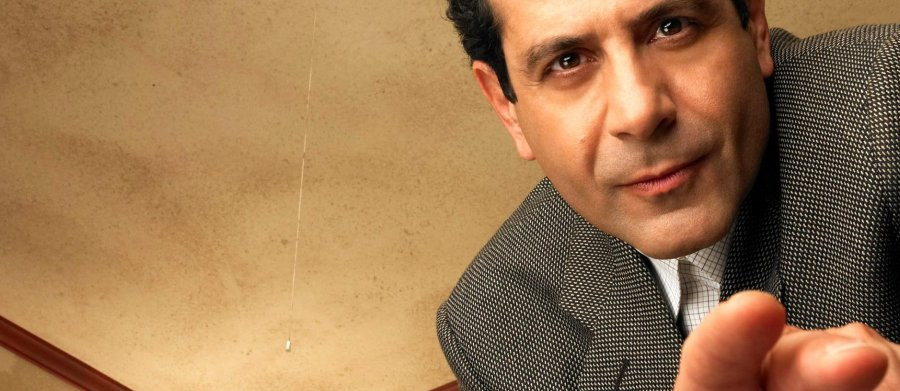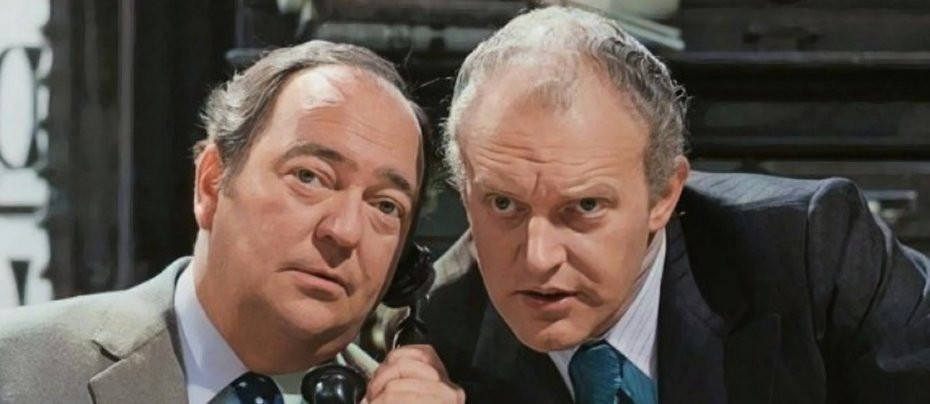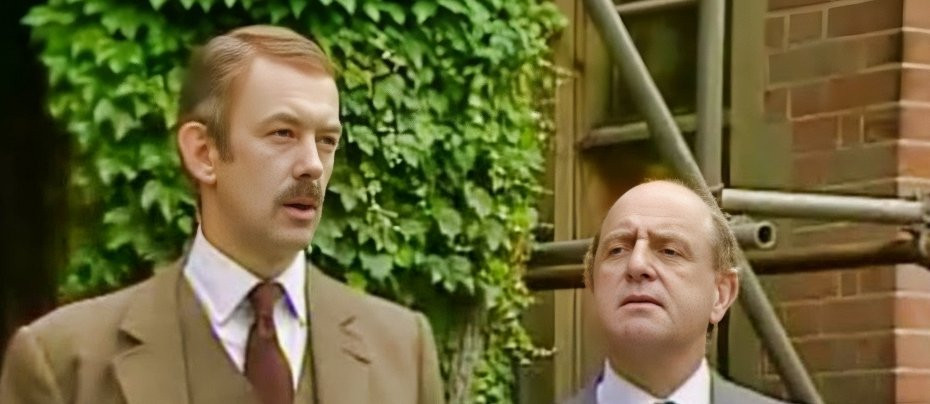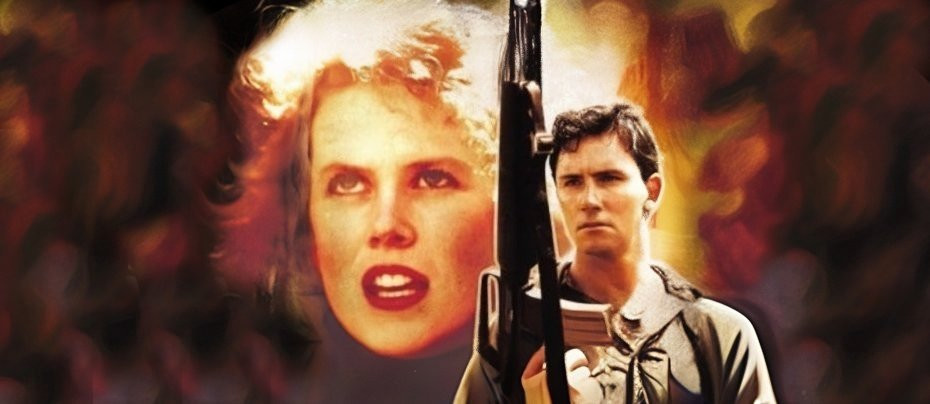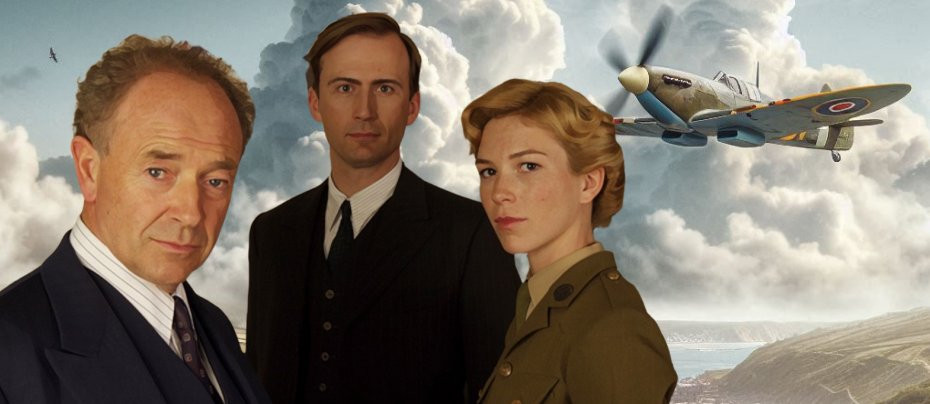
Foyle's War
2002 - United KingdomFoyle's War remains a hugely popular series with a dedicated following…
Review by Daniel Tessier
Running for eight seasons between 2002 and 2015, Foyle’s War was the wartime detective series that became so popular it outlasted its war. Beginning in 1940, it continued through the Second World War and past the Allied victory, before being reinvented as a Cold War spy drama for its final days, holding onto its audience as doggedly as Foyle pursued his cases.
Commissioned to replace the long-running favourite Inspector Morse, Foyle’s War was the creation of Anthony Horowitz. With decades of experience in television, Horowitz had already created the incredibly successful series Midsomer Murders (based on Caroline Graham’s novels) and contributed to historical and detective dramas from Poirot to Robin of Sherwood, and had begun what become a prolific career as a mystery and thriller novelist. Foyle’s War is one of his greatest creations, a series that works as both a cosy Sunday evening mystery and a powerful indictment of the folly of war.
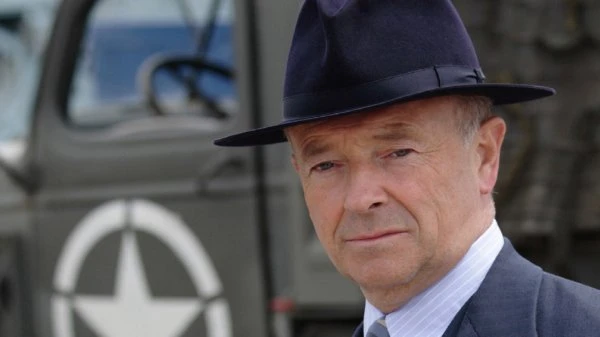
Michael Kitchen (The Hanging Gale, Always and Everyone) stars as Christopher Foyle, Detective Chief Superintendent at Hastings police station. Foyle is serious, dedicated, scrupulously honest, and deeply moral. A widower and a veteran of the First World War, the onset of the Second has left him in a difficult position. He spends much of the early series trying, unsuccessfully, to move into Naval Intelligence or a government position; the better, he believes, to serve his country. Unfortunately for his ambitions, Foyle's strict adherence to the law and his sense of right and wrong frequently pit him against his superiors and those with friends in high places.
While he grows frustrated at having to deal with low-level crimes such as profiteering, smuggling and the black market, it becomes clear that in a time of war, the law is often ignored. Foyle becomes all the more dedicated to ensuring the law is still followed, particularly with the number of murders that begin to dog the south coast. Kitchen gives a terse, softly spoken performance that is nonetheless magnetic. He can dominate a scene with little more than a sigh and a perturbed expression.
Due to so many of the police going away to fight, Foyle has to lead a reduced force, and has to take help from wherever he can. He insists on a driver (we find out years later that he can actually drive, he just doesn't like to) and is provided with Samantha Stewart, transferred from the Mechanised Transport Corps. Played by Honeysuckle Weeks (The Wild House, A Dark-Adapted Eye), Sam is enthusiastic, compassionate, and a bit posh. Her volunteering for uniformed service doesn't go down well with her family (an extended group who all seem to be vicars), but she is dedicated to serving her country and particularly to Foyle. While they don't hit it off straight away, the pair develop a close bond, a surrogate father-daughter relationship that builds over the course of the series.
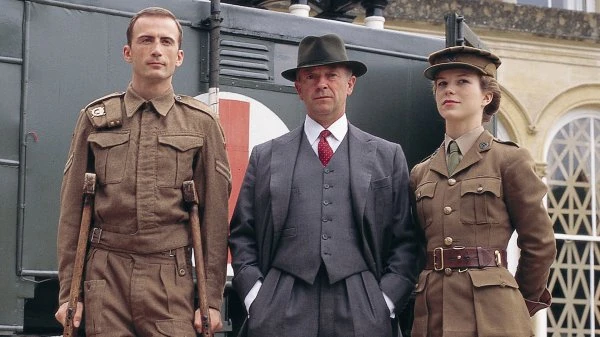
Also recruited is Paul Milner, a former policeman who went to war and, at the start of the series, has just been demobbed home, having lost a leg in the disastrous Norwegian Campaign. Foyle persuades Milner to rejoin the police force as his Detective Sergeant, later promoting him to Detective Inspector. Milner is played by Anthony Howell (Wives and Daughters, The Other Boleyn Girl) as a rigid but well-meaning sort. While Milner is laconic and reserved, Howell's performance often comes across as a little wooden, and Milner never becomes as likeable as Foyle or Sam. Perhaps the problem is how straight he is, both in writing and performance; Foyle, for all his seriousness, has a subtle sense of humour that sneaks out, and Sam has an infectious sense of fun.
As with many ongoing crime series, Foyle's War featured a variety of guest actors who would be central to only one or two episodes. The series boasts an impressive array of young actors at the beginning of successful careers. Notable future big hitters who appear include David Tennant, Andrew Scott, Emily Blunt, James McAvoy and Rosamunde Pike.
At the start of the series, the war is going badly for Britain. The Allies have lost Belgium and Northern France, leading to the evacuation of Dunkirk. Bombing raids are frequent, and the south coast of England is under threat of invasion. With evacuees being moved from London to the coast, and then removed again following the expansion of the bombing, and thousands of men away at war, families have been broken apart. Anti-German sentiment runs high, along with, in short order, anger at Italians and Russians. A counter-governmental fascist movement is growing (which even Milner is briefly seduced by, almost ending his career in the second episode, although it is rapidly forgotten about). Food is scarce and people are becoming ever more demoralised. This is not an easy time to keep the peace in Hastings.
In spite of the grim backdrop, there's a comfort to the programme. It recreates an older England where there was a strong community spirit and people were dedicated to working together for the war effort. Nonetheless, humanity's dark side is only ever under shallow cover, and we see both the best and the worst of people during Foyle's cases. Yet, the series is a pleasure to watch, partly due to the incredible work done to make Hastings looks period authentic. Horowitz researched the setting exhaustively and worked with the Imperial War Museum to make sure that the visuals were as accurate as possible. He tailored the dialogue to be authentic for the time (albeit occasionally removing a potentially forties baffling pop culture reference on protest). Genuine historical events form the backdrop of each episode, with particular prominence in the first couple of series. Focus slowly shifted more onto the murder mystery element and away from the trials of life on the Home Front, although this was never lost completely.
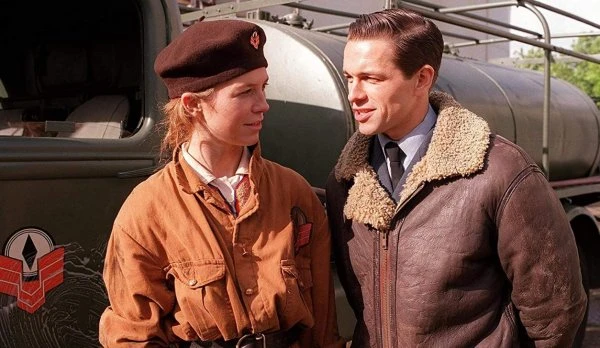
Horowitz wrote or co-wrote all but four of the twenty-eight episodes, each almost a mini-movie in length and scope. Matthew Hall, Michael Russell, Michael Chaplin, Rob Heyland and David Kane also contributed. While each episode was self-contained, there were running storylines throughout. In the early series there was a strong focus on Foyle's relationship with his son Andrew (Julian Ovenden – Bridgerton, The Royal), a fighter pilot with the RAF, who shared a romance with Sam. Of course, many men attempted to romance Sam, especially once the Americans arrived. Milner struggles to deal with his wife's rejection due to his disability. Jane Milner (Mali Harries – Pobol y Cwm) eventually leaves and Milner enjoys a new relationship with Edie (played at first by Caroline Martin, later by Polly Maberly). Even Foyle is not immune to romance, with women from his past occasionally appearing and hinting at secrets from his earlier life.
Perhaps the most significant ongoing storyline is Foyle's tenuous relationship with British Intelligence and his refusal to compromise his morality for the supposed good of the country. On various occasions, Foyle's dogged investigation and refusal to back down under pressure leads him to discover things that the powers that be would rather keep quiet. Sometimes, these are wartime secrets from a government that is having to bend its own rules of morality and fair play. It's when Foyle comes up against straightforward criminals who operate at the highest levels that his anger rises. All too often he is ordered to allow someone to get away with murder because their position or connections make them too valuable to the war effort. More than once, Foyle's quiet fury and a few harsh truths pushes the guilty into taking their own lives; he has a knack for walking away, knowing the likely action the guilty man will take.
The first four series were made up of four episodes (split into two halves across two years for series four), each one moving ahead a month or two through the timeline of the war. In 2008, the fifth series had been written and was set to take place in 1943-44, when ITV's then director Simon Shaps abruptly cancelled the programme. The fifth series went ahead, but Horowitz, not wanting to leave the series on an unfinished note, scrapped the existing scripts and wrote a new set. He moved the narrative ahead a year and incorporated large gaps between the episodes, so that the series could end with the announcement of Victory in Europe. Foyle finally accepts retirement; Milner is promoted to Detective Inspector and transferred to Brighton, along with his pregnant new wife; and Sam uncertainly considers her post-war career.
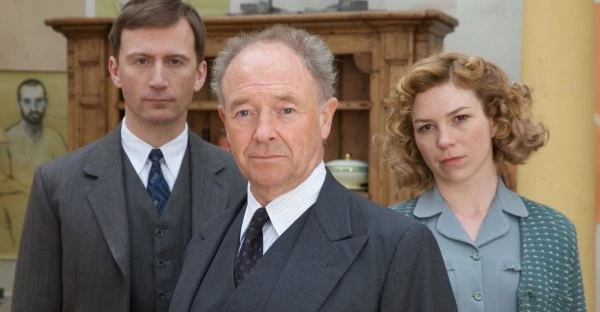
In the event, though, the three episodes of series five achieved excellent ratings. Shaps was replaced by Peter Fincham in 2008, who quickly recommissioned the programme for further series. This left Horowitz in an unusual position, having to continue the story beyond its natural end for a sixth series, airing in 2010. Fortunately, he identified plenty of sources of drama for post-War England, with demobbed soldiers returning home to wives whose lives had changed drastically, prisoners of war in legal limbo, worsening relations with the Soviet Union and racial strife. Foyle, although officially retired, is reluctantly working an extended notice while the force tries to find someone who can replace him, while Milner is leading investigations in Brighton, leading to clashes when they intersect.
Sam, meanwhile, struggles to find her calling post-war, eventually falling into running a guesthouse with the equally proper Adam Wainright (Max Brown – Spooks), beginning a romance that will eventually see them marry. She nonetheless finds herself involved in the various mysteries that Foyle is investigating, even if only tangentially. At the end of these three episodes, Foyle finally gets to leave the police, and sails to the United States – on the trail of a murderer he'd encountered back in series two, whose influence on Anglo-American relations made him untouchable during the war. The war's over now, and Foyle's coming after him.
This would have made a potentially good place to end the series, and it looked like that might be the case, until series seven arrived in 2013. The dramatic potential of Foyle's personal mission in the States was, sadly, overlooked, with the series picking up when he arrives back in England after a year away. Foyle's War had enjoyed some success in the States, broadcast on PBS as part of Masterpiece Mystery, and an American setting could have capitalised on this, although it would require a budget hike for an already expensive production. In spite of this missed opportunity, series seven still saw a significant relocation and reinvention for the programme.
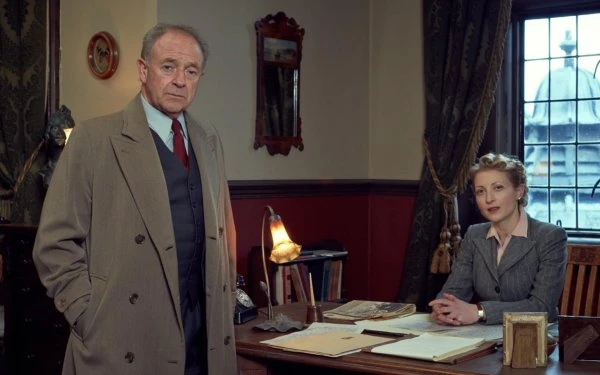
Foyle is intercepted by British Intelligence, including Hilda Pierce, a resolute and cunning operative who had crossed paths with Foyle several times earlier in the series. Played with sardonic class by Ellie Haddington, (Coronation Street, Motherland), who shares an acerbic chemistry with Kitchen, Pierce wants to use Foyle for his skills and his unexpected connection to a major national security risk: Sam is now living in London and working as secretary to a scientist involved in atomic weapons research. It's slightly contrived, but it works to reunite the pair and bring them into the world of espionage, power play and Cold War tensions. Foyle is persuaded to join MI5 on the condition that Sam can act as his assistant. The idea of Sam working in the spy business is frankly hilarious considering her status as the biggest gossip on the south coast, and she invariably creates more complications than she helps solve.
There's no room in this new set-up for Milner, but to be honest, he's hardly missed. Both Pierce and Sam's husband Adam becoming regulars – the latter recast, now played by Daniel Weyman (Silent Witness; Lord of the Rings: Rings of Power). The series gains two more significant recurring characters. MI5 operative Arthur Valentine (Tim McMullen – Magpie Murders) becomes a tenuous ally for Foyle, while Sir Alec Meyerson (the bluff Rupert Vansittart – Heartbeat, Game of Thrones) is the new chief of Foyle's department, and not at all sold on having a middle-aged ex-copper on the payroll. An eighth and final series aired in 2015, continuing in the same vein, its three episodes dealing with such weighty issues as war crimes, inner-city terrorism, the rise in homegrown fascism, and the weighty issues of Zionism and the fate of Palestine, all of which remain disturbingly topical.
Foyle's War remains a hugely popular series with a dedicated following, while Horowitz remains passionate about his creation. Every so often there is a hint that further instalments might be made. While Horowitz himself admits he's more-or-less exhausted the setting, he has suggested that a Christmas special or two would be a welcome follow-up – something we almost got in the form of a short story, “Foyle's Last Case,” printed in the Daily Mail in December 2018. Another suggestion that he is enthusiastic about is a spin-off starring Weeks as an older Sam in the fifties, as a “Miss Marple sort of character.” She's certainly nosy enough. However, it seems that for now, Foyle's war has been fought.
Seen this show? How do you rate it?
Seen this show? How do you rate it?
Published on July 24th, 2024. Written by Daniel Tessier for Television Heaven.



